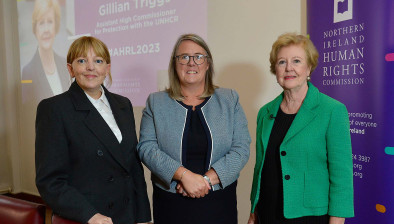Staff member at human rights watchdog reaches settlement in sexual harassment case

Pictured: Fernanda Hermosilla.
A staff member at the Northern Ireland Human Rights Commission is to receive £36,000 after reaching a settlement in a sexual harassment case.
Fernanda Hermosilla settled her case against a colleague for £21,000 and against her employer for £15,000 after taking action against them with support from the Equality Commission for Northern Ireland.
The claims related to a staff Christmas dinner in December 2022 during which Ms Hermosilla experienced unwanted and inappropriate physical contact by a colleague, which was witnessed by other colleagues.
When she returned to work on Monday morning, she was informed by her employer that an investigation into events during that evening was being conducted. A colleague who had witnessed the incident had made a formal complaint.
During the investigation, Ms Hermosilla advised her employer of an earlier incident of inappropriate touching, at a non-work event, that she said happened a few weeks before with the same colleague at a Belfast nightclub.
Ms Hermosilla advised she had been very upset following that incident but had been reluctant to make a complaint because she was only new to her role.
While the internal investigation was underway, Ms Hermosilla worked from the office and the colleague worked from home. However, she claims that despite this, she still worked remotely with this colleague, which she found very difficult.
Following the investigation, Ms Hermosilla believed her employer did not communicate clearly with her about either the outcome of the investigation or the disciplinary action taken.
She understood that the colleague would not be returning to work, but was then advised that they would be returning to their role.
She said she found the whole process and its outcome very upsetting and distressing.
Ms Hermosilla also advised her employer of comments made to her by the same colleague of a racial and political nature, which she also found to be inappropriate. This was also investigated by her employer.
The cases have been settled without admission of liability.
Ms Hermosilla said: “It has been a very difficult time. I did not want or ask for any of this. I was excited to move to Belfast to start a new job and advance my career. This has been a very stressful experience.
“But I’m glad that I took a stand. Everyone must know what unacceptable behaviour is and what I experienced was wrong.
“I want other women to know that they don’t have to accept this type of behaviour in the office or at work parties and that they should always expect to be supported appropriately by their employer.
“I’m glad my case is resolved and now I want to put this behind me and move on with my life.”
Geraldine McGahey, chief commissioner at the Equality Commission for Northern Ireland, said: “We are currently in the middle of the Christmas party season. We know that staff parties and outings are important for team building and for recognition and reward, but employers must ensure that everyone attending is safe and that their dignity is respected.
“Employers must ensure that all staff are fully aware of the standard of behaviour that is expected of them. Employees should also be aware of the consequences of their actions should they behave inappropriately at a staff Christmas party or outing as these are an extension of the workplace.”
In settling its case, the Northern Ireland Human Rights Commission has acknowledged that Ms Hermosilla is a valued employee and further acknowledges the significant upset and distress she felt as a result of being subject to harassment by a colleague.
Furthermore, it has affirmed its strong commitment to the principle of equality of opportunity in employment and will liaise with ECNI to review its equal opportunities and dignity at work policies.
The colleague has apologised for any upset caused.
As part of the settlement terms, Ms Hermosilla and the colleague have agreed to put the matters behind them and to work together going forward on an ongoing basis including in face-to-face settings as necessary. They agreed that mediation was not appropriate.






